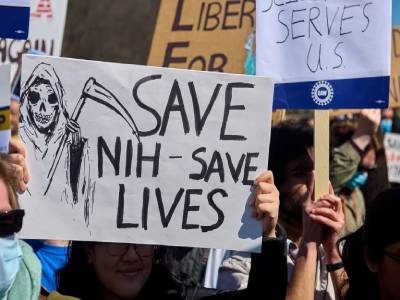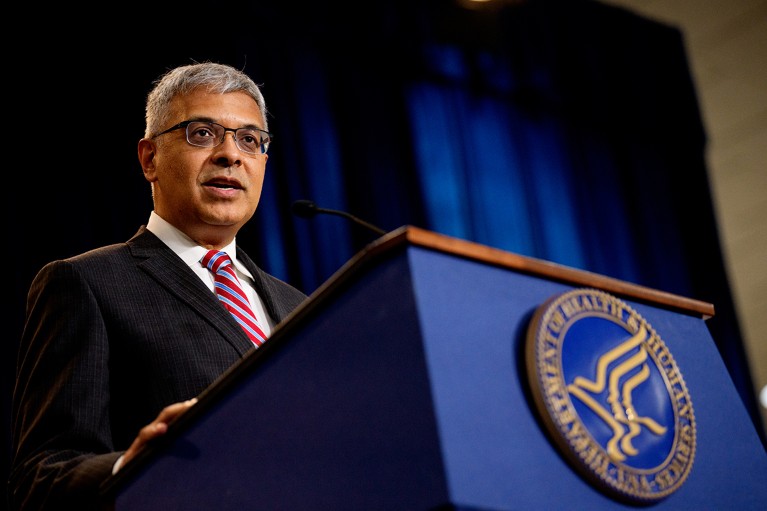
Funding is being rescinded from research into health disparities among people from minority ethnic groups in the United States.Credit: Getty
Dinushika Mohottige had anticipated the termination of her research grant, but it still stung — and left her with questions.

How Trump 2.0 is slashing NIH-backed research — in charts
In 2024, Mohottige, a nephrologist at the Icahn School of Medicine at Mount Sinai in New York City, was awarded a grant by the US National Institutes of Health (NIH) to study how structural racism contributes to kidney disease in a group of Black individuals who are already vulnerable to the condition because of a genetic variant.
The NIH, a major funder of biomedical science worldwide, scored her grant application highly, and by February, Mohottige had even received a notice that her second year of funding had been awarded. But about two week later, the funds were frozen — and on 19 March, the grant was terminated. The notice of termination stated that the award had been cancelled because it related to diversity, equity and inclusion (DEI). US President Donald Trump, who took office in January, has targeted the concept of DEI as “radical” and as undermining US civil-rights laws by prioritizing certain groups over others. “It is the policy of NIH not to prioritize such research programs,” the termination notice stated.
Mohottige found this reasoning confusing because her research proposal did not contain language referring to DEI, which many understand to relate to workforce hiring and training practices. “It begs the question, what does DEI mean to the issuers of this notice? Does it mean the term ‘structural racism’? Does it mean ‘Black Americans’? Does it mean that we can no longer do rigorous science to really understand why the devastating burden of health disparities exist in this country and around the globe?” asks Mohottige, who emphasizes that her views do not represent those of her institution.
Mohottige is one of several researchers studying health inequities whose NIH grants have been cancelled with the same justification. The terminations have raised concerns about the extent to which research in the field will get swept up in the mass cuts to scientific research by the Trump administration.
The NIH did not respond to Nature’s queries about how it defines DEI and about health-disparity researchers’ lives and careers being upended.
Most vulnerable
In January, Trump signed two executive orders calling for the termination of all government DEI programmes and grants funding DEI work. But the orders don’t define DEI other than to say that DEI policies “threaten the safety of American men, women, and children across the Nation by diminishing the importance of individual merit, aptitude, hard work, and determination when selecting people for jobs and services in key sectors of American society”. The orders also call for grant recipients to be in compliance with federal anti-discrimination laws.

Exclusive: Trump White House directs NIH to study ‘regret’ after transgender people transition
This means that “you could interpret DEI to mean many things”, says one health-disparity researcher who spoke to Nature on the condition of anonymity out of fear of reprisal, as did others in this article.
At a public event on 21 April, Trump-appointed NIH director Jayanta Bhattacharya said that the anti-DEI orders had been misunderstood. “I don’t think that they’re aimed at stopping fundamental research that advances the health and well-being of minority populations.”

NIH director Jay Bhattacharya says that work on the biological consequences of characteristics such as race and sex is important.Credit: Andrew Harnik/Getty
And in an interview with Science published on 5 May, Bhattacharya distinguished between studies that look at the biological consequences of individual characteristics such as age, race and sex, which he said were important, and those involving “politicized, DEI kinds of ideology”, which he didn’t define but said didn’t contribute to improving health.
Despite Bhattacharya’s statements, the anonymous researcher says that their own experiences and those of their colleagues suggest that studies on the biological consequences of characteristics are being treated as DEI work. The researcher’s own grant looking at chronic kidney disease in people from minority ethnic groups was terminated this month because of its supposed connection to DEI.
NIH staff members have been given lists of terms, seen by Nature, that are to be used as reasons to reject proposals or flag grants for investigation. They include ‘inequity’, ‘racism’, ‘underserved’ and ‘SDOH’, which stands for the social determinants of health — non-medical factors, such as socio-economic status and access to healthy food, that can explain differences in health outcomes.
The NIH did not respond to Nature’s queries about whether the agency considers racism and social determinants of health as factors contributing to health or whether they are deemed politicized ideology.
A chilling effect
Given the confusion and the cuts made already, “there’s going to be a chilling effect on this line of research”, says a programme officer at an NIH institute, who was granted anonymity because they aren’t authorized to speak to the press. “We will end up having less inclusive research” because people are afraid to submit applications to study health equity, or because they quit academia for lack of funding.


